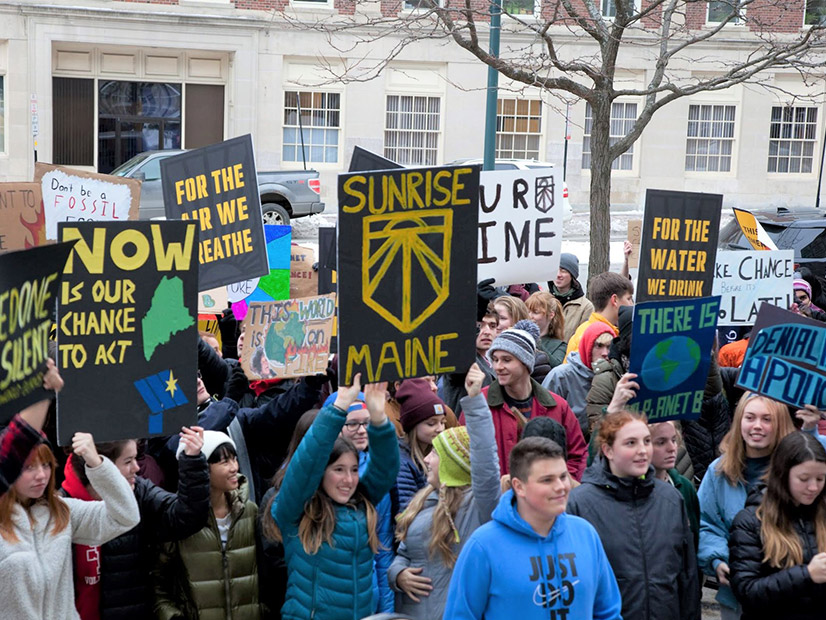As Maine solidifies an aggressive stance on climate, energy and equity, one utility regulator wonders if the state’s traditional electric utility ratemaking principles might be outmoded.
A lot of Maine’s policy on renewable energy and carbon reduction will require significant investments that Maine Public Utilities Commission (PUC) Chairman Philip Bartlett says are funded through electricity rates.
That “starts to change the game on how we think about how rates should be allocated and some of the equity and environmental justice issues that come up,” Bartlett said on Wednesday during a Northeast Energy and Commerce Association webinar about environmental justice in New England.
The state’s climate goals, he said, require investments in and incentives for renewable energy as well as modernizing the distribution grid to accommodate distributed energy resources and load growth from electrification of transportation and heating. In addition, the state needs significant transmission system investments to unlock renewable resources, such as wind power in northern Maine.
An ambitious stance from the legislature on climate change is appropriate, Bartlett said, but he also sees a need to reconsider how the costs of achieving those policy goals are allocated to ratepayers who have different abilities to pay.
Under a traditional cost causation approach to ratemaking, regulators seek to ensure a customer’s rates are equal to costs they add to the system. But adding costs for public policy to rates, he said, does not align with the cost causation principle.
“You have to try to assess whether the cost of these policy programs should be allocated in the same way going forward, because there will be individuals and communities that will be disproportionately impacted as we add these costs to electric bills,” he said.
Building equity and environmental justice into the regulatory space also requires giving everyone a voice in the PUC’s work.
“It’s incumbent upon us as an agency to be constantly thinking about what changes need to be made to truly make our processes accessible,” Bartlett said. If people are not confident that their concerns are heard and accounted for, he added, there will be a lot of opposition to the big changes that are coming.
Equity in Regulation
Maine took a significant step this year to require the PUC and other state agencies to consider environmental justice in their work.
In June, Gov. Janet Mills signed LD 1682, which directs the Governor’s Office of Policy and Innovation and the Future to work with agencies to build an equity framework for decision making.
The Maine Climate Council is tasked with leading that effort and bringing a proposal to the legislature next year, Bartlett said.
A council subcommittee on equity meets monthly and already has begun developing its recommendations on equity and inclusion. The committee expects to take the next six months to conduct public engagement and complete its draft recommendations before issuing a final proposal.
The next subcommittee meeting is scheduled for Aug. 19.
Bartlett says that it’s important that the work of the council clarifies what the goals of environmental justice are and how they fit into agency proceedings.
“To be successful in this work, we have to make sure that voices are heard and that we take significant steps to reach out to impacted communities to make sure that we understand the issues, and that we are making decisions that are truly [in] the best interests of the state and all the affected communities,” he said.
Vermont’s Approach
The Vermont Agency of Natural Resources (ANR) is trying to “hit the reset button when it comes to environmental justice,” Deputy Secretary Maggie Gendron said during the webinar.
ANR includes departments for environmental conservation, fish and wildlife, and forest, parks and recreation. To address issues related to climate justice, diversity, equity and inclusion, the agency has an environmental justice working group and a diversity and equity committee. In addition, it has just hired an environmental justice coordinator, Gendron said.
She said community engagement is central to their work. “We’re working with a contractor to support us in developing a strategy to talk to communities and populations in Vermont that is targeted outreach and is not used as a tool of extraction of information,” she said. In that strategy, ANR wants to fold communities into the process of policy and decision making, she said.
Addressing environmental justice across the agency has been exciting and challenging, Gendron said. Each department is at a different stage of incorporating the work into their policies, so Gendron has focused on reassessing the agency’s position and discovering what environmental justice and injustice is to Vermonters.
“We are on what I would say is the front lines of trying to incorporate a lot of the moving pieces and energy within this work and making sure that there’s consistency across our agency,” she said.
ANR also is central to the activities of the Vermont Climate Council, which was authorized by the 2020 Global Warming Solutions Act. The council has five subcommittees, including one for just transitions. ANR Secretary Julie Moore sits on the council and will help put regulations in place that reflect recommendations to be made by the council for meeting the state’s climate and energy targets.
Council members have been working since last fall to build the state’s first climate action plan, which the council expects to adopt in December. All recommendations in that plan must benefit Vermont’s residents equitably and consider impacts of climate change on marginalized communities.
The Just Transitions Subcommittee created a draft set of equity and justice definitions and guiding principles to support the other subcommittees as they build recommendations for the final action plan. (See Expert Tells Vt. Climate Council to Spend More Time on Equity)
The climate council meets on Monday, when it will hear draft recommendations from three of its subcommittees.



